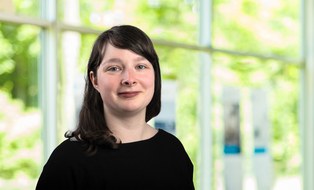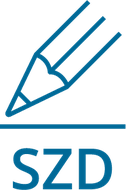Apr 13, 2022
Steep Thesis: Less is more - even when reading technical literature
I can say from experience: The books from the SLUB pile up next to me on the table, they lie on the floor and more and more articles end up in the folder for the seminar or the term paper, which one "then already reads in preparation". Four weeks later, I receive a reminder of the SLUB's loan deadline - but the books are still lying exactly where they were four weeks ago. I returned many books to the SLUB unread, and I also saved dozens of articles for research on various topics and promptly forgot them again. The semester goes on, who has the time to read everything?
In their studies, many students are nearly overwhelmed by specialized literature, and the digitization of many media has made access easier than ever. Courses, such as seminars or lectures, have long literature lists with recommendations from the lecturers on basic literature, and a short search with the search engine of trust offers hundreds of additional sources. But availability is not everything.
In my opinion, it is therefore incredibly important to learn the right way to deal with specialist literature during the course of your studies - so that you don't sink into chaos because you want to read everything or have the feeling that you have to read everything. After eight years of study, I can say: Less is more. It was one of the most important moments in researching a term paper when I realized that I don't have to read every source from beginning to end. The key word here is effectiveness, not speed in reading. I can get through a text as quickly as I want - if I don't know afterwards what arguments the author:s are making or what problems are raised or even solved, then I have wasted time.
Reading technical literature is a very active process: students are not reading passively for entertainment here, it is more about understanding, reflecting, questioning and critiquing. Professional literature can be so complex that even pure reading twice or three times is not enough, and often one is quickly distracted - fatigue, technical terms, difficulty understanding, or just not feeling like it. And there are countless things that are quickly more exciting than a text for the next seminar.
Unfortunately, effective does not always mean fast. However, I think that thorough reading - and ultimately understanding - of technical texts is incredibly more valuable than I-have-to-read-400-pages-today-and-have-forgotten-everything-tomorrow reading. In preparation, active reading also means deciding which texts are worth working on intensively, or even just which sections of a text.
In my opinion, the key to the correct handling of specialized literature is therefore the preparation for reading. If I think about what my goal is in reading - the big why - then I can use the time I have effectively to achieve that reading goal. For example, I can resolve to just skim the text first to get a rough idea; or I can examine a really important text closely for the arguments to understand the author:s point. The literature on reading in college often talks about reading strategies (or reading techniques) that you actively use to help shape and control your own reading process. Reading strategies are not only helpful in directing the reading process, in addition, they also help to overturn the original understanding we have of reading: In everyday life, reading is still understood as a passive process, we consume the newspaper or the novel for fun. Unfortunately, this is seldom the case in academic studies, where we have to work actively with the text. It may be true that (almost) everyone can read, but for dealing with specialized literature one has to learn to read anew.
When I think about it, reading is like many other things: A good plan is half the battle and the rest is a matter of practice. So to keep track, I shouldn't just save every article right away because it might be interesting somehow - a first quick skim reading or searching for keywords in the text can already tell me whether I should really fill up my memory with it.
About the author: Paulina has been a trained writing tutor at the TU Dresden Writing Center since 2017, accompanying the Text Buddy program and giving workshops on academic reading, among other things. She completed her Master's degree in European Languages at TU Dresden and has been studying for her second Master's degree since 2021: Human Communication - Communication Psychology and Management.
 © Sven Ellger
© Sven Ellger
Consultant for Writing Didactics
NamePaulina Hösl M.A.
Project sTUDy smart, expert for AI & writing
Send encrypted email via the SecureMail portal (for TUD external users only).
Writing Center of TUD
Writing Center of TUD
Visiting address:
Fritz-Foerster-Bau, Floor 5, Room 556 Mommsenstr. 6
01069 Dresden
Literature (Selection):
- Damm, Christian. o.D. Fachtexte lesen und verstehen. https://studi-lektor.de/tipps/erfolgreich-studieren/fachtexte-lesen-und-verstehen.html Zugriff: 27.03.2022
- Hambuch, Rebekka. 2020. Lesen im Studium. ILIAS der Philipps-Universität Marburg. https://ilias.uni-marburg.de/ilias.php?ref_id=2059523&obj_id=247992&cmd=layout&cmdClass=illmpresentationgui&cmdNode=h3&baseClass=ilLMPresentationGUI
- Kruse, Otto. 2015. Lesen und Schreiben. 2. Auflage. Wien: Verlag Huter & Roth KG. UTB.
- Pawlaschyk, T. 2012. Tipps fürs Studium, Teil 3. Thema: Lesetechniken. Bergische Universität Wuppertal.
- Menne, Mareike. 2021. Einfach Lesen: Der Umgang mit Texten im Studium. Stuttgart: Verlag W. Kohlhammer.
This post appeared on the occasion of Writing Center Newsletter in April 2022. This and other newsletter issues are linked in the Writing Center Newsletter Archive.
 © TUD
© TUD
Writing Center of TUD
Send encrypted email via the SecureMail portal (for TUD external users only).
Visiting address:
Fritz-Foerster-Bau, room 571 Mommsenstr. 6
01069 Dresden
Postal address:
TUD Dresden University of Technology
Zentrum für Weiterbildung/Career Service
Schreibzentrum
01062 Dresden
The Writing Center of the TU Dresden (SZD) supports students and lecturers with offers for planning and writing various texts in studies such as vouchers, protocols, seminar papers and theses and for teaching academic writing in teaching and supervision. All information about offers and possibilities of support can be found in the areas for students and lecturers.
Translated with www.DeepL.com/Translator (free version)

